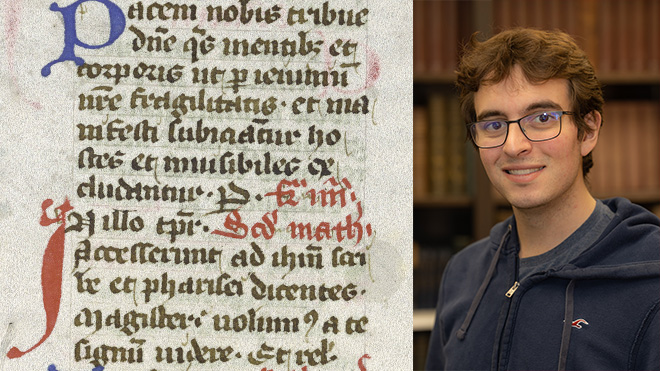Creative writing student is developing a book of elegies to shed light on the realities of climate change
Sam Fouts ‘24 explains his book of Exeter-inspired poetry and how it can serve as an allegorical analysis of the ongoing climate crisis.

Creative writing student is developing a book of elegies to shed light on the realities of climate change
Sam Fouts, a senior English Creative Writing major and Geoffrion Family Student Fellow, is currently in the process of putting together a collection of his own Old English-style poems focused on climate change. He discovered a unique way to spread awareness about this topic that mirrors his literary interests.
“First and foremost, it’s about medieval literature, specifically the Exeter Book, which is an Old English manuscript that contains some of the most famous Old English poems, as well as some extra riddles and elegies,” Fouts said. “It’s like a collection of Old English texts.”
Among several, one famous Old English poem that inspired his work is Beowulf, which he believes may provide fascinating commentary on climate change.
Fouts began his book during his sophomore year and developed it as a project for the Undergraduate Summer Scholars (USS) program. His idea sprouted from an honors extension that he completed for an Old and Middle English literature-focused class, in which he wrote a climate change-focused elegy alongside an essay explaining it in greater detail.
Fouts has been receiving guidance from Patrick Murphy, professor of English, co-director of Miami’s literature program, and medieval scholar. He described Murphy as having been an incredibly helpful source of direction and information in regards to the project.
Fouts hopes that his project will help the public glean insight about the climate crisis in a unique way. As an extension of his research, he has found that Paul Kingsworth’s novel, The Wake, also presents relevant implications for his project.
“I was kind of looking at it as a text on environmentalism and climate change,” Fouts said. “My essay interprets it as sort of an allegory for climate change movements, as well as how it uses time to talk about environmentalism.”
Fouts identified researching and finding proper resources as skills that he strengthened over the course of his extensive process. Doing the required reading and research was a major highlight, as he found a significant amount of fulfillment in exploring academic rabbit holes.
“I got more familiar with academic writing,” Fouts said. “It wasn’t as scary to read books on literary- and theory-based information anymore. I feel like it got more accessible the more I did it.”
The overall experience has opened his mind to previously unexplored sources of information, as well as novel approaches to writing about global issues.
“I think stories are definitely helpful to the general public. It’s good to have stories around,” Fouts said. “They can give you a good framework to process chaotic events like this one – and also feel some degree of solace, or understanding, from the work.”
Following his graduation next spring, Fouts plans to apply to graduate school to acquire a Master of Fine Arts in creative writing.